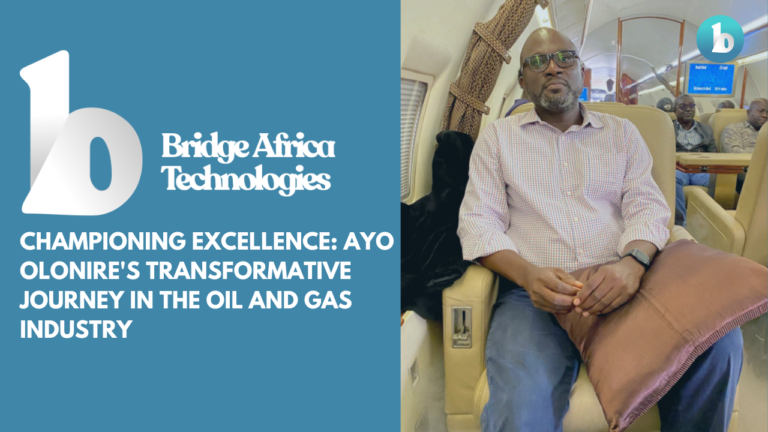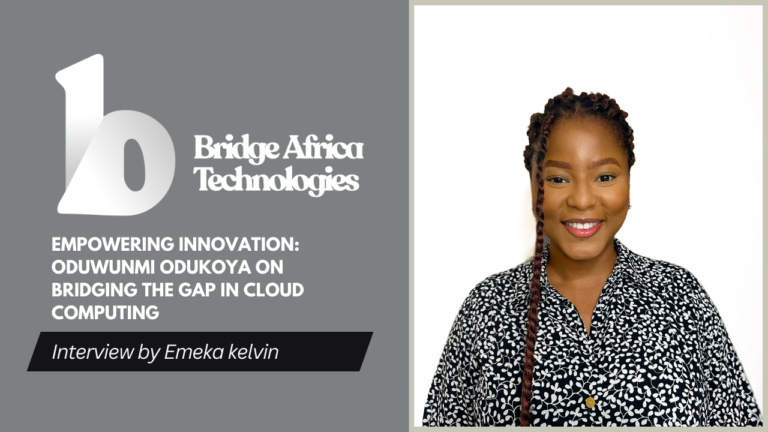Biodoumoye George Bokolo is a Digital Forensics Expert & Investigator, with experience in machine learning, Cyber Crime Investigation, Mobile Device Forensics, Cyber Security, Incident Response and Disaster Recovery, Digital Forensics and Investigations, Advanced Mobile Forensics, Network and Cloud Forensics, Social media forensics, Malware Reverse Engineering, and the Ethics of Digital Forensics.
She is an author of numerous research papers( Research Gate & Google Scholars) with a plethora of prestigious awards, scholarships, and recognitions, including but not limited to the Graduate Student Upstanders in 2021, membership in The Graduate/Undergraduate Instructor Academy (GUIA), designation as a ROADs Scholar at SHSU, recipient of the AAUW fellowship, and the esteemed NELA AWARD – NSLS, among others.
In this interview with Edaile Kingsley, she shared insight into her journey and the challenges of being a Nigerian-born, American-based Digital Forensics Expert & Investigator studying for a doctoral degree.
1. Can you share your journey and motivation to pursue a doctoral degree in digital and cyber forensics science?
Certainly. My journey towards pursuing a doctoral degree in Digital and Cyber Forensics Science is deeply rooted in a sense of purpose and a conviction to contribute meaningfully to the field. The foundational element of my journey is my faith in God, which has served as a guiding force, providing strength, resilience, and a sense of purpose throughout my academic and professional endeavors.
My motivation to delve into digital and cyber forensics science emerged from a combination of personal interests, professional experiences, and a keen awareness of the growing significance of cybersecurity in our interconnected world. As I navigated through my undergraduate and graduate studies, I became increasingly fascinated by the complexities of digital investigations and the pivotal role they play in maintaining the integrity of digital systems.
The evolving landscape of cyber threats and the constant need for experts in the field fueled my determination to contribute to cybersecurity solutions. Recognizing the transformative potential of digital forensics in addressing cybercrimes, I felt a calling to delve deeper into this discipline. It became evident that pursuing a doctoral degree would provide the necessary platform to conduct in-depth research, advance knowledge, and develop innovative solutions to combat cybercrimes.
The decision to pursue a doctoral degree in Digital and Cyber Forensics Science was also motivated by a desire to bridge gaps in current understanding, contribute to the development of best practices, and train the next generation of professionals in this critical field. I am motivated by the prospect of making a lasting impact on digital forensics methodologies, enhancing the resilience of digital systems, and ultimately contributing to a safer and more secure digital environment.
Throughout this journey, my faith has played a central role, providing a moral compass and instilling a sense of responsibility to use my skills and knowledge for the greater good. It has been a journey of continuous learning, perseverance, and a commitment to serving a purpose larger than myself.
2. You are a Nigerian woman living in the United States Of America and a Digital Forensics Expert & Investigator. How did your background shape your life and what you do today?
As a Nigerian woman living in the United States and a Digital Forensics Expert & Investigator, my background has played a pivotal role in shaping both my personal and professional life. Growing up in Nigeria, I was immersed in a vibrant culture that instilled values of resilience, adaptability, and a strong sense of community. These foundational principles have been instrumental in navigating the challenges and opportunities presented by life in the United States.
My Nigerian heritage has fostered in me a deep appreciation for education and continuous learning. This value has driven me to pursue a career in the highly dynamic field of digital forensics. The diverse experiences and perspectives I gained growing up in Nigeria have honed my problem-solving skills, enabling me to approach digital investigations with a multifaceted and analytical mindset.
Moving to the United States provided me with access to cutting-edge technology and resources, further fueling my passion for digital forensics. The advanced educational and professional opportunities in the U.S. allowed me to specialize in this field, honing my expertise in investigating cybercrimes and contributing to the broader digital security landscape.
The amalgamation of my Nigerian roots and American experiences has equipped me with a unique perspective in the digital forensics space. It has fostered a cultural sensitivity and understanding that proves invaluable when dealing with diverse cases and collaborating with professionals from various backgrounds. This has also empowered me to bridge communication gaps and contribute to the development of comprehensive solutions to combat cyber threats.
In essence, my journey from Nigeria to the United States has been a transformative one, shaping me into a Digital Forensics Expert & Investigator with a rich blend of cultural insights, technical acumen, and a commitment to addressing the evolving challenges in the digital space.
I carry my Nigerian heritage with pride, drawing strength from its values, while embracing the opportunities presented in the U.S. to make meaningful contributions to the field of digital forensics.
3. What specific areas within digital and cyber forensics are you most passionate about and why?
As a Digital Forensics Expert and Investigator, I am particularly passionate about several key areas within the field due to their critical roles in enhancing digital security and combating cybercrimes:
The first one will be Machine Learning in Digital Forensics, Leveraging machine learning algorithms for cybercrime detection and profiling adds a dynamic layer to digital forensics. My enthusiasm in this area stems from the potential to enhance detection capabilities, automate processes, and stay ahead of evolving cyber threats through the power of artificial intelligence.
second area will be Malware Analysis and Reverse Engineering; Understanding and dissecting malicious software is essential for developing effective countermeasures. The ever-evolving nature of malware challenges me to continuously learn and stay ahead of emerging threats, contributing to the ongoing battle against cybercriminals.
Incident
The third area will be the Response and Cyber Threat Intelligence; The swift and strategic response to cyber incidents is crucial in minimizing damage and preventing future attacks. Investigating and understanding the tactics of threat actors fuel my passion for developing proactive strategies, bolstering cybersecurity postures, and mitigating potential threats.
Finally is the Digital Forensics Training and Education; Sharing knowledge and empowering the next generation of digital forensics experts is a fulfilling aspect of my work. I am passionate about creating educational programs, workshops, and resources that equip individuals with the skills needed to combat cybercrimes and contribute to the cybersecurity landscape.
My passion for digital and cyber forensics extends across various domains, driven by a commitment to staying at the forefront of technological advancements, contributing to the global fight against cyber threats, and imparting knowledge to shape the future of digital security.
4. How do you see the intersection of cutting-edge technology and investigative methodologies shaping the future of digital forensics?
I envision the convergence of cutting-edge technology and investigative methodologies as a transformative force shaping the trajectory of digital forensics in the future. The seamless integration of advanced technologies such as artificial intelligence, blockchain analysis, and machine learning holds the promise of revolutionizing the investigative landscape. These innovations not only enhance the efficiency of digital evidence collection and analysis but also empower investigators to unravel intricate cybercrimes with unprecedented precision. As technology continues to evolve, the synergy between state-of-the-art tools and investigative methodologies will undoubtedly propel digital forensics into a new era, where the pursuit of justice in the digital space is characterized by heightened accuracy and agility.
5. What challenges do you anticipate in the evolving landscape of digital and cyber forensics, and how do you plan to address them in your research?
In anticipating the challenges inherent in the evolving landscape of digital and cyber forensics, I recognize the constant evolution of cyber threats and technologies as a primary hurdle. Addressing these challenges in my research involves adopting a proactive stance by integrating cutting-edge technologies, such as artificial intelligence and machine learning, to stay ahead of emerging threats.
Additionally, the increasing sophistication of encryption methods poses a persistent challenge, necessitating a continuous exploration of innovative decryption techniques. Collaborative efforts with industry experts and staying abreast of the latest advancements are integral components of my strategy to ensure the adaptability and relevance of my research methodologies in the face of dynamic challenges within the digital and cyber forensics domain.
6. Are there particular technological advancements that you find most promising or concerning in the context of forensic science?
In my short term in this field, recent technological advancements have been particularly promising, notably the integration of advanced artificial intelligence (AI) algorithms and machine learning models. These innovations hold the potential to revolutionize evidence analysis, offering more efficient and accurate insights into complex investigations.
The utilization of AI in digital forensics, especially for detecting and analyzing patterns in large datasets, enhances the capacity to uncover nuanced details crucial for solving cybercrimes.
However, the increasing prevalence of deepfake technology presents a concerning challenge, as it has the potential to manipulate digital evidence and deceive forensic analyses. Balancing the benefits of technological progress with the need for robust countermeasures against emerging threats remains a critical consideration in the ever-evolving landscape of forensic science.
7. How do you balance the theoretical aspects of academia with the practical demands of real-world investigative work in your doctoral studies?
In navigating the intersection of academia’s theoretical works and the pragmatic demands of real-world investigative work during my doctoral studies, I adopt a comprehensive and adaptive approach. While immersed in theoretical research, I ensure its practical relevance by aligning my studies with ongoing developments in the field.
Engaging in collaborative projects, internships, and hands-on experiences allows me to apply theoretical frameworks to tangible scenarios, bridging the gap between academic knowledge and practical application.
This synergy not only enriches the theoretical foundation of my doctoral work but also hones my ability to address real-world challenges, fostering a dynamic skill set that is both theoretically sound and practically effective in the complex landscape of investigative endeavors. The practical aspects give me joy and allow me the patience to deal with the annoying stressful academic aspect of it.
8. Can you share any insights into the ethical considerations you encounter in both your private investigative work and academic research?
In my capacity as a digital forensics expert engaged in private investigative work, ethical considerations form the bedrock of my professional conduct. One paramount concern revolves around privacy rights, necessitating a delicate balance between extracting pertinent information and respecting the privacy of individuals. Ensuring that the methods employed for digital evidence collection do not infringe upon the rights of innocent parties is a continual challenge.
Moreover, the authorization to access and scrutinize digital devices must align with legal and organizational boundaries. Upholding the integrity of evidence is pivotal, requiring meticulous adherence to established procedures for preservation, collection, and documentation to ensure its admissibility in legal proceedings.
Maintaining client confidentiality is another ethical imperative, demanding the safeguarding of sensitive information and judicious navigation of situations where legal or ethical standards necessitate disclosure.
Simultaneously, as a final PhD student engaged in academic research within the realm of digital forensics, ethical considerations are integral to the entire research process. Obtaining informed consent from research participants is paramount, especially when dealing with sensitive or personal data. Rigorous measures are implemented to safeguard data security, encompassing anonymization and de-identification techniques to protect against unauthorized access.
Adhering to publication ethics is imperative, encompassing transparency, avoidance of plagiarism, and maintaining the highest standards of academic integrity. Striving for impartiality and objectivity is foundational to the research ethos, ensuring that findings contribute positively to the field of digital forensics without causing harm or misuse.
In essence, ethical conduct serves as the ethical compass guiding both my private investigative work and academic pursuits, fostering credibility and trust within the digital forensics discipline.
9. What inspired you to pursue a career in digital forensics, and how do you hope to contribute to the field upon completing your doctoral studies?
The inspiration to pursue a career in digital forensics stemmed from a fascination with the intricate interplay between technology and investigations. Witnessing the growing prevalence of digital crimes and the challenges they posed, I became intrigued by the prospect of unraveling complex cyber incidents. This curiosity led me to delve into the field of digital forensics, where I discovered the profound impact technology has on modern investigations.
The pursuit of understanding digital evidence and contributing to the resolution of cybercrimes became a driving force, motivating me to embark on a journey that encompasses both private investigative work and academic research. As a digital forensics expert, the synthesis of practical experience and academic rigor has enriched my perspective, providing a comprehensive approach to addressing the ethical and technical complexities inherent in the field.
Upon completing my doctoral studies, I aspire to contribute significantly to the evolution of digital forensics. I aim to bridge the gap between theoretical knowledge and practical application, fostering advancements in investigative techniques and methodologies.
By leveraging the insights gained through rigorous academic research, I intend to develop innovative solutions that enhance the field’s capabilities in addressing emerging challenges, such as sophisticated cyber threats and the evolving landscape of digital crimes.
Additionally, I aim to play a role in shaping educational programs, imparting the ethical considerations and technical skills necessary for the next generation of digital forensics professionals. Through a holistic approach that combines expertise in both private investigations and academia, I hope to leave a lasting impact on the field, contributing to its continuous development and resilience in the face of evolving digital landscapes.
10. In your opinion, what role does collaboration play in advancing the field of digital forensics, and have you engaged in any notable collaborative projects?
Collaboration stands as a cornerstone in advancing the field of digital forensics, fostering a multidisciplinary approach to tackling the intricate challenges posed by evolving technology and cyber threats. The complex nature of digital crimes often requires expertise from diverse domains, including computer science, law enforcement, legal studies, and cybersecurity.
Collaborative efforts enable the pooling of knowledge and resources, resulting in more robust methodologies, innovative tools, and comprehensive solutions. Engaging in partnerships with professionals from various backgrounds allows for a holistic understanding of the issues at hand, leading to more effective and nuanced responses to the dynamic landscape of digital investigations.
Personally, I recognize the pivotal role of collaboration in my work as a digital forensics expert and final PhD student. I have actively participated in collaborative projects that bridge the gap between academia and industry, fostering a symbiotic relationship between theoretical research and practical application. These collaborations have involved working alongside law enforcement agencies, cybersecurity professionals, and legal experts to address real-world digital forensic challenges. Such projects have not only enriched my own perspective but have also contributed to the development of more effective and ethically sound digital forensic practices.
As a digital forensics expert and researcher, I am committed to fostering further collaborative initiatives that push the boundaries of the field. By continuing to engage in interdisciplinary projects, I aim to contribute to the advancement of digital forensics, ensuring that the discipline remains at the forefront of addressing emerging technological challenges. Through these collaborative endeavors, I seek to enhance the efficiency and efficacy of digital investigations, ultimately benefiting both the academic community and the broader spectrum of stakeholders involved in combating digital crimes.
11. How do you stay updated on the latest developments in technology and methodologies relevant to your field of study?
In my pursuit of staying at the forefront of advancements in my field of study, I employ a multifaceted approach to continuous learning and information assimilation. Engaging with reputable scholarly journals, attending industry conferences, and participating in webinars enable me to access the latest research findings and expert insights. Moreover, I cultivate a strong online presence within relevant professional communities, fostering meaningful connections with experts and practitioners. This proactive networking not only provides me with real-time updates on emerging technologies but also facilitates insightful discussions that broaden my understanding of evolving methodologies. Additionally, I allocate time for hands-on experimentation with cutting-edge tools and technologies, ensuring a practical understanding of their applications and implications in my area of expertise. This holistic strategy ensures that I am well-equipped to navigate the dynamic landscape of technological innovation within my field.
12. Could you elaborate on any specific methodologies or tools you find particularly effective in digital and cyber forensics, based on your practical experience?
In my practical experience within the realms of digital and cyber forensics, I have found certain methodologies and tools to be particularly efficacious. Embracing a holistic approach, I leverage open-source intelligence (OSINT) techniques to gather preliminary information, creating a foundation for subsequent investigative processes. Additionally, the structured use of digital forensic tools such as EnCase and Autopsy proves instrumental in the systematic examination of digital evidence, enabling comprehensive analysis while maintaining evidentiary integrity. Harnessing the power of the Volatility Framework for memory forensics has proven invaluable in uncovering volatile artifacts, providing a nuanced perspective in investigations. Moreover, the integration of machine learning algorithms, especially in malware analysis, has emerged as a potent ally in identifying and understanding intricate cyber threats. This amalgamation of traditional methodologies with cutting-edge tools underscores my commitment to a dynamic and adaptive approach in addressing the complexities inherent in digital forensics
Artificial Intelligence (AI) occupies a central role in my approach to digital and cyber forensics, acting as a catalyst for heightened efficiency and precision. Leveraging AI-powered tools for pattern recognition and anomaly detection significantly enhances the speed and accuracy of data analysis, especially when dealing with vast datasets in complex investigations. Machine learning algorithms play a pivotal role in automating routine tasks, allowing forensic experts to focus on more nuanced aspects of investigations. In the evolving landscape of cyber threats, AI’s ability to adapt and learn from new patterns equips forensic practitioners with a proactive defense mechanism, staying ahead of the curve in identifying emerging security challenges. The seamless integration of AI into the forensic workflow exemplifies its transformative impact, ensuring a comprehensive and forward-looking approach to digital investigations
13. As a final-year doctoral student, what advice do you have for aspiring professionals looking to enter the digital forensics field?
HONESTLY? Dont do it lol…
As a final-year doctoral student immersed in the intricacies of digital forensics, my advice for aspiring professionals entering this dynamic field is rooted in a multifaceted approach. Firstly, cultivate a strong foundation in both theoretical knowledge and practical skills by actively engaging with academic resources and hands-on experiences.
Stay abreast of the latest technological advancements and emerging methodologies through continuous learning, leveraging platforms like conferences, webinars, and professional networks. Additionally, seek mentorship from seasoned practitioners to gain valuable insights into real-world challenges and solutions.
Develop a proactive mindset towards embracing evolving technologies, such as Artificial Intelligence, as integral components of your toolkit. Lastly, foster effective communication skills, as the ability to convey complex technical findings in a comprehensible manner is paramount in the interdisciplinary landscape of digital forensics. By amalgamating theoretical rigor, practical proficiency, and adaptability, aspiring professionals can position themselves as adept contributors in the ever-evolving domain of digital forensics.
14. How do you envision the integration of digital forensics into broader criminal justice systems, and what impact do you anticipate on investigations and legal proceedings?
Envisioning the integration of digital forensics into broader criminal justice systems involves recognizing the transformative role technology plays in contemporary crimes and investigations. As a digital forensics expert and final PhD student, I foresee a seamless integration where digital evidence becomes a pivotal component of criminal investigations, complementing traditional forensic methodologies. The ubiquity of digital devices and the increasing sophistication of cybercrimes necessitate a comprehensive approach to criminal justice that incorporates digital forensics seamlessly.
This integration holds the potential to significantly enhance the efficiency and accuracy of investigations, providing law enforcement and legal professionals with valuable insights into the digital activities of suspects. Moreover, it can contribute to proactive crime prevention by leveraging digital intelligence to identify emerging threats and patterns.
Anticipating the impact on investigations and legal proceedings, the integration of digital forensics is poised to bring about a paradigm shift in the way evidence is collected, analyzed, and presented in court. The reliance on digital evidence can lead to more robust and conclusive case outcomes, strengthening the prosecutorial arm of the criminal justice system.
However, it also underscores the importance of ensuring the ethical collection and handling of digital evidence to safeguard individual privacy rights. The legal landscape may need to adapt to the evolving nature of digital crimes, with courts and legal professionals becoming more adept at interpreting and assessing digital evidence.
Overall, the integration of digital forensics has the potential to streamline criminal justice processes, but it necessitates ongoing collaboration between digital forensics experts, law enforcement agencies, and legal professionals to establish standards and ensure the fair and ethical use of digital evidence in legal proceedings.
15. Any last words?
As a Digital Forensics Expert and Investigator, my journey from Nigeria to the United States has been shaped by a rich blend of cultural insights, technical acumen, and a commitment to addressing cyber threats. My Nigerian heritage instilled values of resilience and adaptability, while my experiences in the U.S. provided advanced opportunities to specialize in digital forensics.
Motivated by faith and a desire to contribute meaningfully, I pursued a doctoral degree in Digital and Cyber Forensics Science. My journey reflects a fusion of personal interests, professional experiences, and a recognition of the growing importance of cybersecurity globally. My motivation is anchored in a deep sense of purpose, guided by faith, and driven by a conviction to make a lasting impact.




